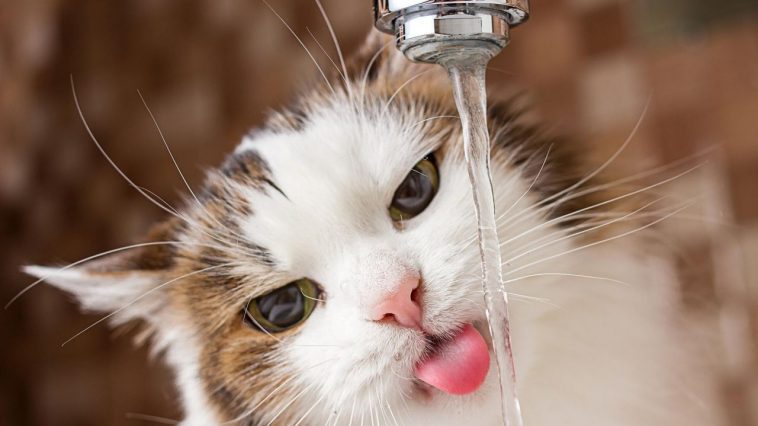Dehydration can have critical consequences for them
Many domestic cats have a very difficult relationship with water, they carry it in their DNA, they do not like contact with this liquid, neither to swim nor to clean themselves, and they are not very prone to drink either. As owners we must ensure that the amount of water they ingest daily is significant enough, it is not worth watching the bowl and filling it only when it is not overflowing. We must not forget to measure whether or not you consume water, because in the long run the lack of liquid in your body can cause serious health problems, such as lower urinary tract disease, among others.
Then a question arises, if as owners we must watch that the cat ingests water and that it is sufficiently nourished, what happens with wild cats? Because having a characteristic and instinctive trait of rejection of water could be incompatible with the life of this species when there are no humans to watch over their health. The explanation is simple, cats that do not live in the domestic environment acquire the water they need to nourish themselves from the prey they hunt and with which they are fed.
It is true that the body of cats does not need a large amount of water, so it can be enough with the liquid found in the composition of the muscles of the animals they ingest, whether they are rodents, reptiles or birds. As in the human being, the water content of other living beings is equivalent to around 70% of their body. But if domestic cats eat dry food to a greater extent, they can only find water in the supply of wet cans and in the water bowl.
Reasons why a cat may refuse to drink water at home
Although drinking water is not their favorite activity, it is not common for a cat to refuse nourishment if their instincts tell them that it is necessary. When a cat stops drinking water at home, it can be due to several factors that we, as humans, generally have a lot to do with and interpret.
The most reassuring reason is that its wet food diet is very rich, and the animal does not feel the need to drink more. This would mean that the same level of hydration that you would get by hunting a press and feeding on it would be achieved with domestic wet food. In that case, we probably shouldn’t do anything else, since not drinking from the bowl wouldn’t be a problem.
There is a long list of instinctive or social reasons for a cat not wanting to drink water, and they are largely related to their territorial and sometimes sybaritic personality. Cats hate dirt, in this sense they are very different from dogs, a cat may show its rejection and disagreement with an unhygienic litter box or an unclean bowl, there may be a reason here: the bowl in which you give it water he doesn’t like it, either because he finds the material unpleasant or because the water isn’t as clean as he needs it to be.
A cat will avoid drinking even when his body asks him to hydrate if the bowl displeases him. It is common for plastic containers to be unpleasant for him because plastic can impregnate the water with a different taste that tells him that it is poisonous water, for this reason pet bowls (especially cats) are usually made of stainless steel or glass, that modify the taste of food and water less. The height of this situation is that the bowl is very close to their litter box.
For cats, hygiene issues at this level are essential: they completely refuse to have their food or water near where they defecate.
A similar situation that can cause your cat to refuse to drink from its bowl is that another cat is sneaking it. Cats have a territorial behavior that sometimes makes them very sensitive to competition, if another cat eats or drinks from their bowls, they can develop a visceral rejection because in this exercise the other cat may be expelling hormones on the water, the bowl, or the surrounding ground, turning the taste and smell of your water into an ingestible declaration of war.
Problems for cats derived from not drinking water
When a cat enters into a dynamic of drinking less water than its body needs, a very complex cycle begins in which everything seems to go against it. The less hydration, the more loss of appetite you will have, especially for dry foods. His body becomes lethargic, he feels depressed and unmotivated. The lack of water in your diet will cause more constipation, because the stool will harden and intestinal transit will be limited.
Not only will the digestive system be involved, but also the kidneys, the lack of water can cause kidney failure because once the cat enters a state of continuous dehydration, the blood begins to filter worse and urea and creatinine will be incorporated into the body. bloodstream, producing a critical imbalance in your health.
Not all the symptoms are serious and critical, there are also others that are more visible and that denote a reason to act while we still have time. If your cat’s skin has a clear lack of elasticity, it is dry as well as its lips and mouth.
The lack of hydration is soon perceived in its physical appearance , skin problems end up leading to coat problems. Also, dehydrated cats can be seen panting loudly, having trouble breathing because the nose is not moistened enough.
Solutions to avoid dehydration
To solve this problem, we just have to encourage them to drink water, taking into account all the possible causes of unpleasantness that we have mentioned before: place more drinkers around the house, preferably away from the sandbox and made of stainless steel or glass, never plastic. If there is another cat, find a way to keep this other one from approaching the water bowl of the one with the hydration problem.
If your cat has not yet lost its appetite, you should simply spray its dry food with water, so you can help it ingest liquid without being aware of it. You can also increase the amount of wet food you give, cans are highly recommended because they provide a wide range of nutrients but 80% of their content is water.



